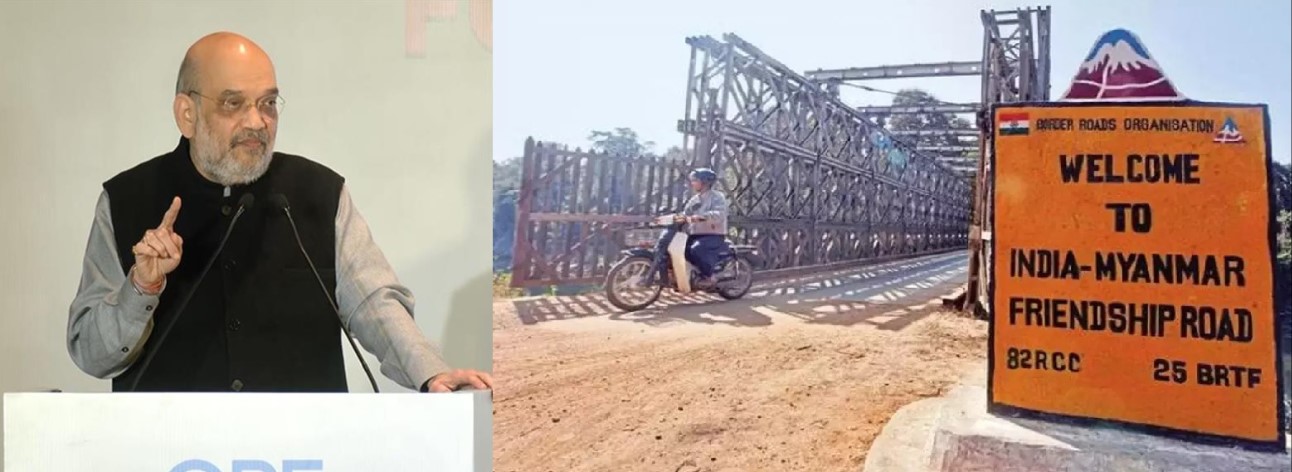India Immediate Suspension of Free Movement Regime with Myanmar for Enhanced Border Security

Defense News ,India :- Union Home Minister Amit Shah announced the immediate suspension of the Free Movement Regime (FMR) between India and Myanmar, emphasizing the need to bolster internal security and preserve the demographic structure of India's North Eastern states sharing borders with Myanmar. The decision comes in tandem with the ongoing process within the Ministry of External Affairs to eliminate the FMR, a policy allowing individuals near the India-Myanmar border to travel 16 km into each other's territories without a visa.
Shah, in a post on X, reiterated Prime Minister Narendra Modi's commitment to securing India's borders and outlined the government's multifaceted approach, including the construction of a fence along the entire 1643-kilometer India-Myanmar border and the implementation of a patrol pathway to enhance surveillance capabilities. This strategic shift follows the announcement of two pilot projects utilizing a Hybrid Surveillance System (HSS) to fence specific stretches in Arunachal Pradesh and Manipur, with additional approvals for further fencing works in Manipur.
The decision to scrap the FMR is a pivotal step in the government's efforts to address concerns related to illegal migration and insurgency. Local residents and northeast states have voiced complaints that the FMR policy is prone to misuse, facilitating illegal activities such as immigration, drug trafficking, and arms smuggling. The Manipur government, among others, has previously raised these issues with the Central government.
The India-Myanmar border, spanning states like Mizoram, Manipur, Nagaland, and Arunachal Pradesh, has operated under the FMR since its initiation in 2018 as part of India's Act East policy. Under this policy, individuals from hill tribes residing within a 16 km radius on either side of the border were allowed to cross with a border pass, valid for one year, permitting a stay of up to two weeks per visit.
The government aims to replace the FMR with a comprehensive border fencing project expected to be completed within the next four-and-a-half years. Individuals entering will be required to obtain a visa, marking a departure from the open-border policy. The decision intends not only to curb the misuse of the FMR, exploited by insurgent groups for attacks before escaping to Myanmar but also to stem the inflow of illegal immigrants and disrupt networks involved in drug and gold smuggling.
An official involved in the plan revealed that the Ministry of Home Affairs is in the process of tendering for an advanced smart fencing system covering 300 km of the India-Myanmar border. The project's implementation is set to commence shortly, indicating a proactive stance in achieving enhanced border security.
Allegations suggest that the political turmoil following the military coup in Myanmar in February 2021 led to an influx of Myanmar's tribal population into Indian territories, particularly Manipur and Mizoram, resulting in illegal activities such as drug smuggling. Manipur Chief Minister N Biren Singh had, in September 2023, appealed to terminate the FMR, citing its exploitation by insurgents. The porous border regions, with only a fraction currently fenced, have witnessed a steady influx of illegal immigrants, prompting the need for a comprehensive security overhaul.
In Mizoram, the aftermath of the Myanmar coup saw thousands of anti-Junta rebels seeking refuge, further emphasizing the strategic importance of border security measures. Manipur, with approximately 390 km of porous border, faced challenges as individuals attempted to enter the state, prompting the Chief Minister to seek a policy change. Arunachal Pradesh and Nagaland, sharing extensive borders with Myanmar, also stand to benefit from the enhanced security measures, ensuring the stability of India's northeastern region.
The decision to suspend the Free Movement Regime reflects a proactive stance by the Indian government in addressing security concerns and aligning its policies with the changing geopolitical landscape in the region. As India navigates challenges posed by illegal immigration, insurgent activities, and external geopolitical shifts, the strategic realignment of its border policies is crucial for maintaining national security and safeguarding the demographic composition of the North Eastern states.


